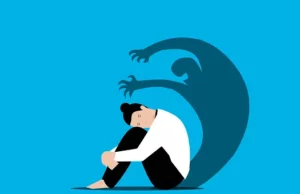Religious intrusive thoughts (RITs) are thoughts that persist in the mind despite efforts to ignore or suppress them. These thoughts typically involve a specific religious belief or affiliation, and they can be intrusive and distressing. Many people suffer from RITs on a regular basis, but they don’t always know what to do about it. In this blog post, we will explore symptoms, triggers, and treatments for religious intrusive thoughts. We hope this information will help you find relief and start taking steps to manage RITs effectively.
Contents
- 1 What are Religious Intrusive Thoughts?
- 2 Symptoms of Religious Intrusive Thoughts
- 3 Triggers for Religious Intrusive Thoughts
- 4 Treatment of Religious Intrusive Thoughts
- 5 Can Religious Intrusive Thoughts Affect Relationships?
- 6 When To Seek A Doctor’s Help For This?
- 7 5 Practices One Should Have To Deal With Religious OCD
- 8 Conclusion
What are Religious Intrusive Thoughts?

Religious intrusive thoughts (RIT) are intrusive, unwanted thoughts or images that typically involve a religious doctrine or belief. RIT can occur at any time but is most commonly experienced during moments of stress or during periods of anxious or panic-filled episodes.
Symptoms of Religious Intrusive Thoughts
If you’re having intrusive thoughts about religion, there’s a good chance that it’s because of an anxiety disorder. Religious intrusive thoughts are those where you focus on religious symbolism or rituals and become consumed with negative thoughts about them.
There are a few different symptoms of religious intrusive thoughts, but all of them share one common element: they cause distress or interfere with your quality of life. If you’re having these thoughts frequently, they can be a sign that you have an anxiety disorder.
The most common symptom is Religious Intrusive Thoughts (RIT) causing distress. This means that the thoughts are persistent and bother you enough to impact your everyday life. Other symptoms include Images or ideas intruding your mind involuntarily; Thoughts that keep coming back; Thoughts that make you feel scared or uncomfortable; and Thoughts that make you feel like withdrawing from social activities.
RIT can be triggered by a range of things, including stress, traumatic events, and mental health conditions like depression or anxiety. However, some people can experience RIT regardless of their mental health status.
If you’re experiencing any of the above symptoms and they’re impacting your quality of life, it’s worth checking in with your doctor. They can help rule out any underlying conditions and provide treatment if necessary.
Triggers for Religious Intrusive Thoughts
 There are many triggers for religious intrusive thoughts, but few are universal. Some common triggers include:
There are many triggers for religious intrusive thoughts, but few are universal. Some common triggers include:
-Memories or thoughts of a personal religious experience
-Rumination about religious doctrine or beliefs
-Observing others in a religious context
-Reading or hearing about religious content
-Belief that one is possessed by a deity or spirit
Treatment of Religious Intrusive Thoughts
There is no one-size-fits-all answer to treating religious intrusive thoughts, as the condition can vary from person to person. However, some of the most common methods of treatment include cognitive therapy and mindfulness. Cognitive therapy helps people understand and work through their negative thoughts, while mindfulness is a practice that helps people focus on present-moment experiences. Other methods of treatment may also be effective, depending on the individual’s symptoms and triggers.
Can Religious Intrusive Thoughts Affect Relationships?
Religious intrusive thoughts (RITs) are intrusive, persistent thoughts or images of religious-based themes that can affect a person’s life. While these thoughts may seem like harmless distractions, RITs can lead to stress, anxiety, and depression in some people. Some common triggers for RITs include stress from work or school, being around other people who are religious, and being around religious symbols.
There is no one definitive treatment for RITs, but therapies that focus on reducing the stressors that trigger them can be helpful. Medications such as antidepressants or antianxiety medications may also be effective in treating RITs if they are causing significant distress. In some cases, cognitive-behavioural therapy (CBT) or mind-body exercises may be necessary to help change the way a person thinks about religion.
When To Seek A Doctor’s Help For This?
When people experience intrusive thoughts, they may feel as if the thoughts are happening in their own minds rather than being a part of someone else’s mind. Intrusive thoughts can be disturbing and cause great anxiety or distress. Some common symptoms of religious intrusive thoughts are feeling like you are being watched or judged constantly, believing that particular religious beliefs are true even when there is evidence to the contrary, and experiencing strong urges to sin or blaspheme. If you’re concerned about your mental health, it’s important to seek help from a doctor. There are many different treatments available for religious intrusive thoughts, and the most effective one depends on the individual’s specific situation.
5 Practices One Should Have To Deal With Religious OCD
 1. Understand the nature of religious OCD. Religious OCD is a type of OCD that is focused on religious obsessions or compulsions. Religious obsessions can be very specific and focused, while religious compulsions can be more general and often involve performing rituals or engaging in repetitive behaviour.
1. Understand the nature of religious OCD. Religious OCD is a type of OCD that is focused on religious obsessions or compulsions. Religious obsessions can be very specific and focused, while religious compulsions can be more general and often involve performing rituals or engaging in repetitive behaviour.
2. Identify the triggers that cause religious OCD to flare up. There are many possible triggers for religious OCD, but some of the most common are things that make someone feel uncomfortable about their religion or beliefs. People with religious OCD may feel compelled to avoid certain thoughts or behaviours related to their religion because they fear they will sin or transgress some rule.
3. Seek professional help if symptoms become too severe or intolerable. If symptoms of religious OCD become too severe or intolerable, it may be worth seeking professional help. A mental health professional can help identify the root causes of the disorder and develop a treatment plan that is tailored to the individual’s needs.
4. Stay informed about available treatments for religious OCD. There are currently no cure medications for religious OCD, but there are various treatments available that can help manage symptoms and improve quality of life. Some common treatments include cognitive-behavioural therapy (CBT), medication, and self-help groups like Relate.
Conclusion
In conclusion, religious intrusive thoughts are a common experience for many people, but they can be extremely distressing. If you are having religious intrusive thoughts that interfere with your everyday life, it is important to seek professional help. Triggers and symptoms of religious intrusive thoughts can vary from person to person, so it is important to find an approach that works best for you. Treatment options may include medication or therapy but always consult with a healthcare professional before making any changes to your health regimen. Thank you for reading!
For more information and guidance, please contact OCDMantra. OCD is a mental health disorder characterized by obsessions and compulsions. If you have any queries regarding OCD treatment, OCD Counseling, ERP therapy experienced therapists at OCDMantra can help: Book a trial OCD therapy session


